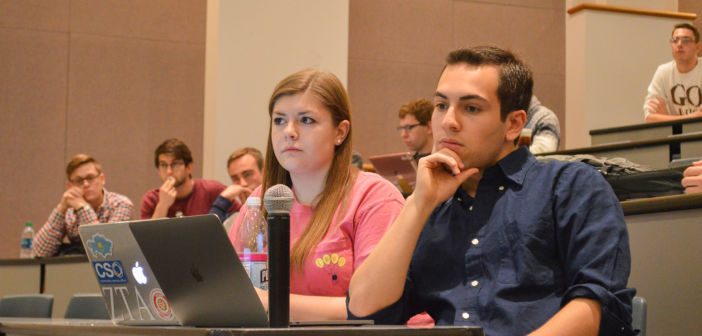Student Senate XXX started its tenure in an uncommon way — by going over resolutions new Student Senate president Matt Rothberg, ’18, will present to the board of trustees at the annual Student Affairs Committee meeting May 18.
The resolutions come as a result of discussions from the town hall hosted by Senate on April 26 and are meant to start conversations regarding student safety.
At the meeting, Rothberg presented five resolutions drafted by him and previous Senate president Dakota DiMattio, ’17. The resolutions presented at the meeting are still drafts that will be altered before being presented to the board of trustees.
“At the town hall, a lot of people spoke their opinions, and we tried to put all those opinions into this resolution the best way that we could,” Rothberg said.
Three resolutions passed and two were tabled.
The resolutions that passed a Senate vote dealt with the implementation of more comprehensive alcohol education for all students, the implementation of an anonymous pre-registration survey regarding alcohol consumption and the broadening of the medical amnesty policy.
For broadening the medical amnesty policy, the resolution suggests extending the amnesty to the student who is the victim and not just to the friend calling for help. Many senators were concerned about the clarity of the policy and said students needed to be educated on what it does and does not cover.
Interim dean of students Katherine Lavinder said some students’ confusion on the medical amnesty policy centers on the police response. She said when amending, Senate should add language to clarify how the police response and criminal process is impacted by calling for medical amnesty.
The proposed pre-registration survey would be taken anonymously by all students every semester and would be used as a way for students to track their own alcohol consumption over time. Additionally, the results would be used to gauge a more accurate understanding of students’ alcohol consumption and implement them into alcohol education programs.
After being heavily debated at the Senate meeting, the two tabled resolutions will be amended and voted on electronically by Senate members before the scheduled board of trustees meeting.
One tabled resolution dealt with moving parties on campus to the Hill while also staying inclusive. Other campus spaces could be created so students who are not involved in Greek life could also participate in the social scene.
This resolution caused debate among senators, some of whom argued that if parties moved on campus, then similar opportunities to hold parties had to be afforded to non-Greek organizations, such as clubs and athletic teams. Matt Kitchie, the Senate adviser and director of student activities, said he believed moving parties to the Hill could help perpetuate the Greek and non-Greek divide.
The other tabled resolution dealt with researching the implementation of an “open door policy” similar to ones other schools, such as Stanford University, have implemented in their on-campus dorms. This policy would let students drink in their rooms as long as they kept the door open and ideally keep them from high-risk drinking behaviors.
The resolutions’ purpose is to start conversations between the administration and students, specifically about these measures and student safety in general.
“There’s a lot of issues going on right now where students are drinking to excess and are getting sick because of it,” Rothberg said. “We really need students to recognize the issue at hand and to come up with ways to solve it as a student body, but we also need help from administrators to alter the policies currently in place.”






Comment policy
Comments posted to The Brown and White website are reviewed by a moderator before being approved. Incendiary speech or harassing language, including comments targeted at individuals, may be deemed unacceptable and not published. Spam and other soliciting will also be declined.
The Brown and White also reserves the right to not publish entirely anonymous comments.